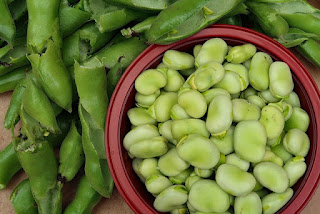Broad beans :
Also known as fava beans, have been a beloved and versatile ingredient in cuisines worldwide for centuries. With their unique taste, velvety texture, and impressive nutritional profile, these legumes offer a delightful culinary experience and numerous health benefits. Let's explore the wonders of broad beans and why they deserve a prominent place in your kitchen.
Native to the Mediterranean region and parts of Asia, broad beans have a rich history dating back to ancient times. They were cherished by the Egyptians, Greeks, and Romans, who recognized their culinary and medicinal properties. Today, broad beans are cultivated in many countries worldwide, making them readily available for food enthusiasts and health-conscious individuals.
One of the reasons broad beans have stood the test of time is their versatility in cooking. They can be enjoyed in various forms: fresh, dried, or even canned. Fresh broad beans have a crisp, earthy flavor that intensifies when cooked. Their tender texture and delicate taste make them an excellent addition to salads, stews, and pasta dishes. Dried broad beans are commonly used for making purees, soups, and spreads, adding a hearty and robust flavor to the recipes. Canned broad beans offer convenience and can be used in salads, casseroles, or as a tasty snack.
Beyond their delectable taste, broad beans pack a powerful nutritional punch. They are an excellent source of plant-based protein, making them a valuable addition to vegetarian and vegan diets. A 100-gram serving of broad beans provides approximately 6 grams of protein, along with essential amino acids needed for building and repairing tissues.
Broad beans are also rich in dietary fiber, which aids digestion and promotes a healthy gut. This high-fiber content contributes to feelings of fullness, making them an ideal choice for those watching their weight or looking to maintain a balanced diet. Moreover, the fiber in broad beans supports heart health by reducing cholesterol levels and maintaining stable blood sugar levels.
These legumes are a treasure trove of vitamins and minerals.
Broad beans are an excellent source of folate, a B vitamin crucial for pregnant
women as it helps prevent birth defects. They also contain vitamin K, important
for blood clotting, and vitamin C, a potent antioxidant that boosts the immune
system. Additionally, broad beans provide an array of minerals such as iron,
magnesium, and potassium, which contribute to overall well-being and proper
bodily functions.
When preparing broad beans, it's important to note that they require some extra attention. If using fresh broad beans, they need to be shelled and blanched before adding them to recipes. The outer skins can be a bit tough and are usually removed, revealing the vibrant green inner bean. This extra step is worth the effort, as it enhances the culinary experience.
To conclude :
Broad beans are a culinary gem that offers both
delicious flavors and impressive health benefits. Their versatility in cooking,
high protein and fiber content, and abundance of essential vitamins and
minerals make them a true superfood. So, why not explore the world of broad
beans and savor their delightful taste while nourishing your body? Whether
enjoyed in a salad, puree, or stir-fry, broad beans are sure to add a touch of
vibrancy to your meals while keeping you healthy and satisfied.


Comments
Post a Comment